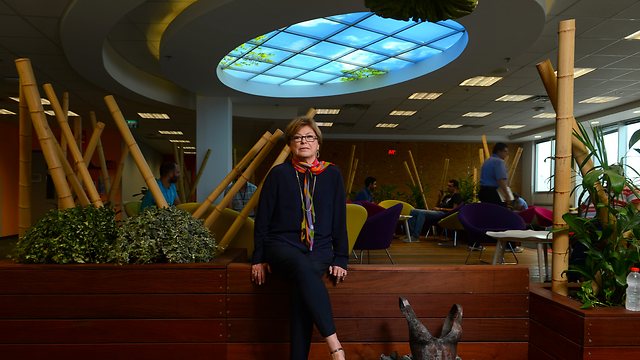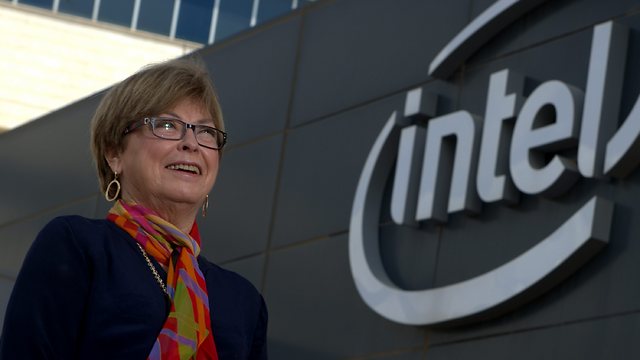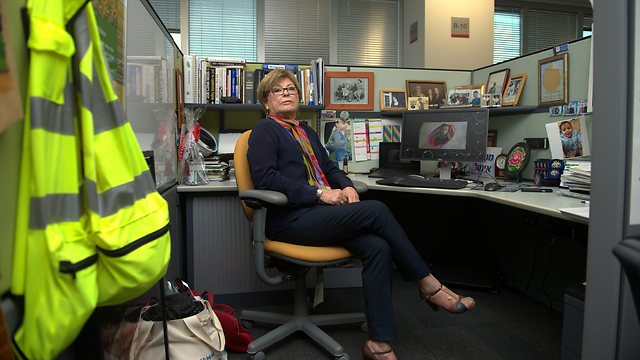No, that’s not advice from a radio talk-show host. That’s what Maxine Fassberg, Intel Israel’s CEO, told a female student whose spouse wanted to give up her career. And Fassberg has a lot more to say about chauvinism in Israel, the company she runs, and why she works in a small cubicle rather than a fancy office.
A few months ago Maxine Fassberg, CEO of Intel Israel, held a private meeting with a small group of female students at the Weizmann Institute of Science. Among the topics discussed was a painful but familiar one: The hardships of young women who wish to both further their academic careers and raise a family.
One of the students said her spouse made it clear that after they have children, she’d have to spend much less time on her research. Fassberg’s decisive answer to that statement shocked everyone in attendance. “I told her: Think very hard if you really want to marry him,” she says.
When you speak with Fassberg about subjects close to her heart, she allows herself to be blunt. That’s not just true for private meetings with students, but also in her interview with us. The current situation, which sees female students choosing technological majors in disproportionately small numbers to their male counterparts, infuriates her.
She also rejects any claim which hints at women having to be the ones who give up their career when children are born. “When I married my husband,” she says, “his mother gave him a badge of honor: You married a teacher, she’ll be home every day by 12pm. When I was recruited to join Intel, she called him and asked ‘what happened? There was order here.’ True, that was 30 years ago, but things are still moving slowly. We’ve come a long way, but we’re still far from having an equal world. I was at a conference for female students last week at the Hebrew University of Jerusalem. 150 young women sat there and asked me, how do you do it? How do you do it?”
The ex-teacher Fassberg now serves as the head of a small giant: The largest employer in the Israeli high-tech industry, with about 10,000 employees. The company exports products worth approximately $4.25 billion a year. This makes Fassberg one of the most influential women in Israel, specifically regarding its economy.
But the problem of female under-representation in Israeli high-tech companies is evident in Intel Israel as well: Only 21% of the employees there are women. Lately, the company has announced steps intended to increase the number of women who work there – such as bonuses for employees who help recruit women or scholarships for female college students – but Fassberg reminds us that the problem is also derived from the nature of Israeli society, which doesn’t encourage women to choose a career in the tech fields.

“Israel is very chauvinistic,” she says, “I feel it myself. I get emails to this day that say ‘For Mr. Maxim.’ This chauvinism comes from the home. Ask a mother what men’s and women’s roles are and she’ll tell you. Why don’t girls study chemistry, physics, and math? It starts with the parents.”
Missing the silence
Fassberg is 65 years old, married with two children. The story of her rise to the top is quite unusual. She made aliyah to Israel in 1975, and after completing her degree in physics and chemistry at the Hebrew University, started working as a high school teacher. After being rejected as a candidate for school principal (“Come back in 20 years,” they told her), she decided to change professions.
Fassberg answered a wanted ad for Intel and started working there as an engineer. That was in 1983, and since then Intel has become her second home. She rose to managerial positions, ran the assembly line in Kiryat Gat, and in 2007 was appointed to the coveted role of Intel Israel CEO.
Intel’s managerial ranks saw a slight drama occur in 2012, when Mooly Eden, a senior vice president, was appointed to a position above Fassberg – president and head of Intel Israel activities, with her remaining CEO, responsible for Intel’s manufacturing. This strange situation of Intel having two heads recently ended with Eden’s retirement, leaving Fassberg once again at the top of the “kingdom.”
Unlike what you might expect, the position of CEO doesn’t bring with it a fancy office. Intel prides itself on the fact that the CEO sits in a small cubicle, just like any run-of-the-mill programmer. “The logic behind it says that a workplace should be open and accessible, enabling the exchange of ideas, a place that encourages exchanging information and pointing out problems early on,” Fassberg explains. She also doesn’t have a reserved spot in the company parking lot. “The only ones with reserved parking spots are pregnant women,” she says.
Are there negative aspects to being in such a role?
“I think that sometimes I miss the silence. If I enter a room and close the door, someone will knock on it wanting to ask something within a minute. That’s a corporation’s workload – everyone needs something from me all of the time.”
You’ve been with Intel for 32 years. Don’t you feel like doing something new and crazy? Founding a start-up, for instance?
“You don’t know how many crazy things I’ve done at Intel. There’s not an Intel factory in the world that has to contend with a reality like Israel’s. 2009, for instance, is a year I’d rather not repeat. At the year’s start, Operation Cast Lead was ongoing, then there was a dockworker strike, and then there were protests against the Jerusalem plant, which operated on Saturdays. None of my international Intel equivalents have had to contend with strikes, wars, and protests in one year. Each of these things requires a different creative solution. I’m very adventurous.”
What adventurous things have you done?
“I built a unique treatment system for the plant’s waste, in its courtyard. You might say that’s not adventurous, but I can tell you it’s the first project of its kind in Israel, meant to treat the brackish water and sewage created during production. The purified water will be recycled in the cooling facilities, or used for agriculture.”
Ok, that’s still not like taking an idea and turning it into the next Apple or Google.
“Because you think all ideas need to be called Apple. I’m speaking about clean water technology, and the change it’s affecting across Israel, and about Ireland understanding the need for it and copying it.”

Calming Intel down
Israel is one of the most important territories for Intel worldwide. Beyond the Kiryat Gat factory, which makes chips that eventually find their way to PCs all over the world, Israel also houses extensive development work in the company’s Haifa, Jerusalem, Petah Tikva, and Yakum centers. The bulk of development work for Intel’s new Skylake processor was done by an Israeli team.
Does Intel international digest Israel’s wars easily?
“I spent the last summer in the air, in flights. Protective Edge was our longest war – 50 days – and we needed to speak with people at Intel, so they wouldn’t have bad thoughts. Meanwhile, this time the Iron Dome system did a good job and everyone understood that. The holding company worries only about us reaching supply deadlines, and we’ve never missed a shipment, not during the first Lebanon war and not during the 19th.”
What about those calling for a boycott of Israel?
“Do you know how long there have been calls for a boycott? Just a short time ago we read about an attempted terrorist attack on a Belgian train. The world is dangerous, everywhere. So maybe it’s less dangerous in Arizona than in Israel, but both of us get our chemicals from Japan, and when Japan has a tsunami and chemicals are out of stock, it doesn’t matter where the factory is.”
“In many ways, we’re better protected than other Intel factories in the world. I spoke with Intel’s international head of security, and he told me: You’re surrounded by a high wall and have gates, we don’t even have a regular wall around the factory or anything to stop some crazy person who decides to do something. But yes, I’m not saying it’s a piece of cake – you need to occasionally explain things to Intel’s board of directors.”
No time to be insulted
During noontime, Intel’s lunchroom is packed. Long lines stretch back in front of trays filled with salads, schnitzels, potatoes and barbecue meat. The workers here have every reason to be happy: As is expected in the high-tech industry, salaries are high, offices are spacious, leased cars are parked in the company lot, and the kitchen has piles of chocolate chip cookies waiting to accompany your cup of coffee. Sometimes a barber, an optometrist, and even a greengrocer come by, to give the thousands of workers some on-premises service and save them some time.
This is all well and good, but what about the long hours, the pressure, the grind? How do you balance a private life with working in an international company that puts up demanding goals and deadlines?
“Every person needs to decide where his or her limit is. Last Sunday I was at our development center in Petah Tikva. At 5pm I packed up my things. Sunday is the day I go home at 4pm-5pm, because they aren’t working in America, so it’s possible. And here, I see workers in the cafeteria making themselves coffee. I asked them: What happened? Why aren’t you going home? Are the coffee and the work a substitute for giving the kids a bath? Three of them blushed. And why won’t you see a woman there? Because she knows she has to go, since she has another job waiting at home.”
“I measure workers by productivity, not the hours they work. Michal Hovav, who’s responsible for the $6 billion project of upgrading the Kiryat Gat factory, told everyone in advance that she won’t be holding any meetings between 6:30pm and 9pm. Want to talk up until 6:30pm? Fine. Want to talk after 9pm? Perfectly ok. But between those hours I have three kids and a husband. Bye, ciao. And surprise surprise, it works. Everyone aligned themselves with Michal’s time window, and there are no meetings between 6:30pm and 9pm. So maybe it takes someone with Michal’s character to demand this, but none of the executives would dare call me and complain about her not being available during those hours.”
And what about older workers, those in their 40s and 50s? Are they in demand in the high-tech industry?
“When we search for people with experience we don’t care how old they are. The attempt to come and say that high-tech won’t get you to a pension is nonsense. The question is whether people want to learn new things, and that has to do with character, not age.”
While her colleagues in the high-tech industry talk about the need for establishing innovative start-ups, Fassberg is pushing for the establishment of more traditional industries. “Intel Israel imports its necessary chemicals from Japan. Why, really? I want to bring about the establishment of a local industry of chemicals for chip manufacturing, which will supply the huge quantities needed not just for Intel in Israel, but for the Ireland factory as well, for example. It’s a different type of industry that will attract a different type of worker,” she says.

Intel has drawn strong criticism in recent years, after being granted generous sums by the state,sums meant to encourage the company to keep building factories here. These days, the company’s Kiryat Gat space looks like a giant construction site – the upgrade project for its factories is in full stride, including the construction of a huge bridge, which will connect the two existing manufacturing areas. All of this will enable production of the company’s future chips.
Doesn’t it insult you when they criticize the grants Intel gets?
“I can’t be insulted. If I were insulted I would have had to go home a long time ago. The work is too hard for insults, I don’t have time for it. Today, there’s no one in the government who doesn’t understand the benefit Intel brings to the country. Even the press has gradually stopped passing criticism.
What was the most emotional moment for you in the past few years?
“Lighting the beacon on Independence Day. It was the most exciting thing I’ve done in my life. Really. I didn’t know it would be that way. I didn’t get there because of my pretty eyes, but because of what I’ve done at Intel. And when I stood there and said I was doing it in the name of all of our workers – it was very emotional.”
And what was the boldest, craziest decision you’ve made?
“My scale for crazy things and yours are a bit different, apparently. I did things that are unusual in the inner and outer-Intel milieu, and I do them successfully, without sparking wars, and later they become the consensus. Changes need to be made without shouting in the street. You need to be smart rather than right. Never mind, I don’t want to talk about crazy things. Just look outside: Would you believe it? I built that.”
As reported by Ynetnews
